Edgar Allan Poe 的介绍演示文稿
- 格式:ppt
- 大小:827.00 KB
- 文档页数:12
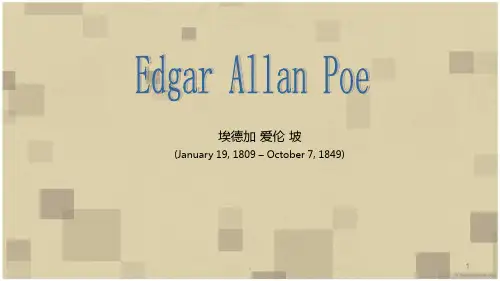
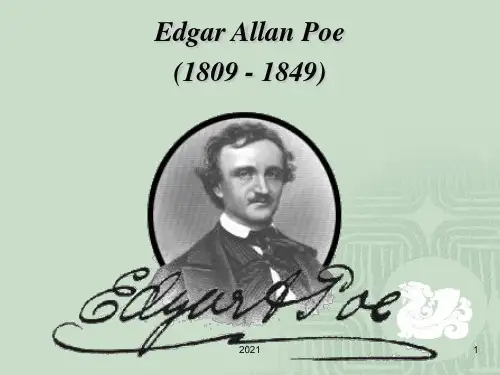
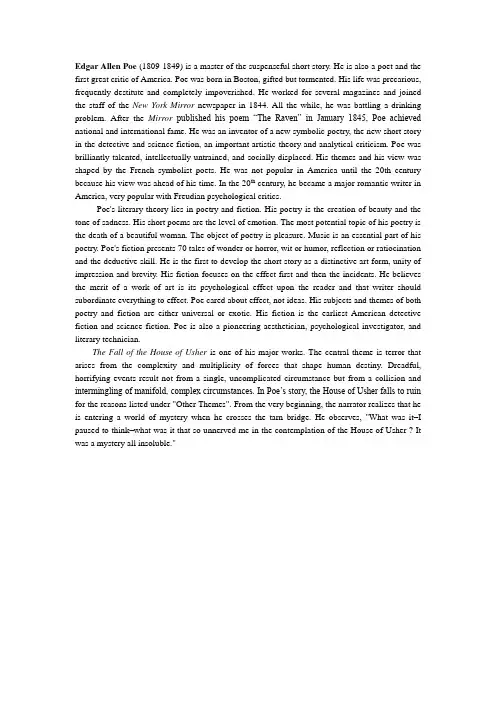
Edgar Allen Poe (1809-1849) is a master of the suspenseful short story. He is also a poet and the first great critic of America. Poe was born in Boston, gifted but tormented. His life was precarious, frequently destitute and completely impoverished. He worked for several magazines and joined the staff of the New York Mirror newspaper in 1844. All the while, he was battling a drinking problem. After the Mirror published his poem “The Raven” in January 1845, Poe achieved national and international fame. He was an inventor of a new symbolic poetry, the new short story in the detective and science fiction, an important artistic theory and analytical criticism. Poe was brilliantly talented, intellectually untrained, and socially displaced. His themes and his view was shaped by the French symbolist poets. He was not popular in America until the 20th century because his view was ahead of his time. In the 20th century, he became a major romantic writer in America, very popular with Freudian psychological critics.Poe's literary theory lies in poetry and fiction. His poetry is the creation of beauty and the tone of sadness. His short poems are the level of emotion. The most potential topic of his poetry is the death of a beautiful woman. The object of poetry is pleasure. Music is an essential part of his poetry. Poe's fiction presents 70 tales of wonder or horror, wit or humor, reflection or ratiocination and the deductive skill. He is the first to develop the short story as a distinctive art form, unity of impression and brevity. His fiction focuses on the effect first and then the incidents. He believes the merit of a work of art is its psychological effect upon the reader and that writer should subordinate everything to effect. Poe cared about effect, not ideas. His subjects and themes of both poetry and fiction are either universal or exotic. His fiction is the earliest American detective fiction and science fiction. Poe is also a pioneering aesthetician, psychological investigator, and literary technician.The Fall of the House of Usher is one of his major works. The central theme is terror that arises from the complexity and multiplicity of forces that shape human destiny. Dreadful, horrifying events result not from a single, uncomplicated circumstance but from a collision and intermingling of manifold, complex circumstances. In Poe’s story, the House of Usher falls to ruin for the reasons listed under "Other Themes". From the very beginning, the narrator realizes that he is entering a world of mystery when he crosses the tarn bridge. He observes, "What was it–I paused to think–what was it that so unnerved me in the contemplation of the House of Usher ? It was a mystery all insoluble."。
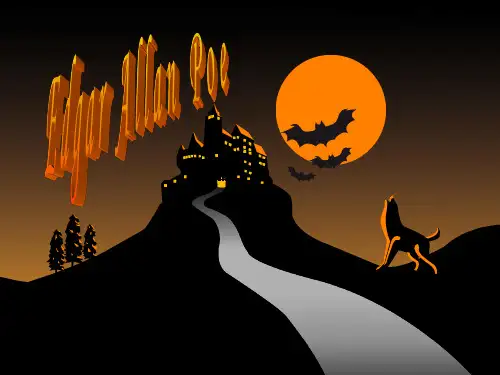
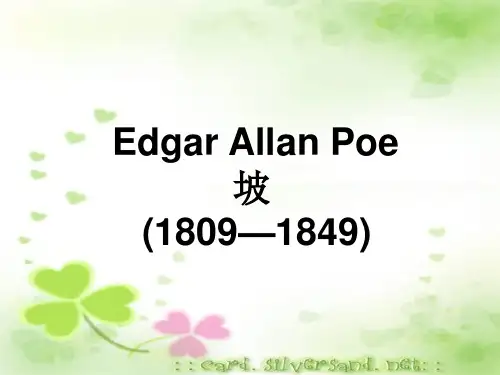
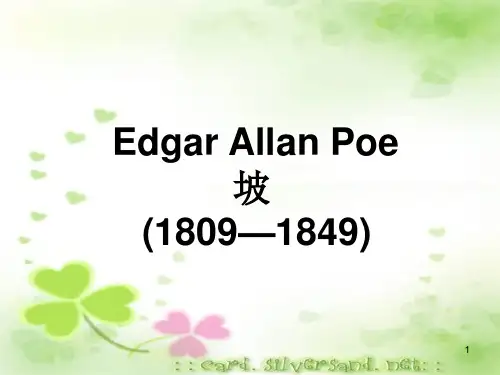
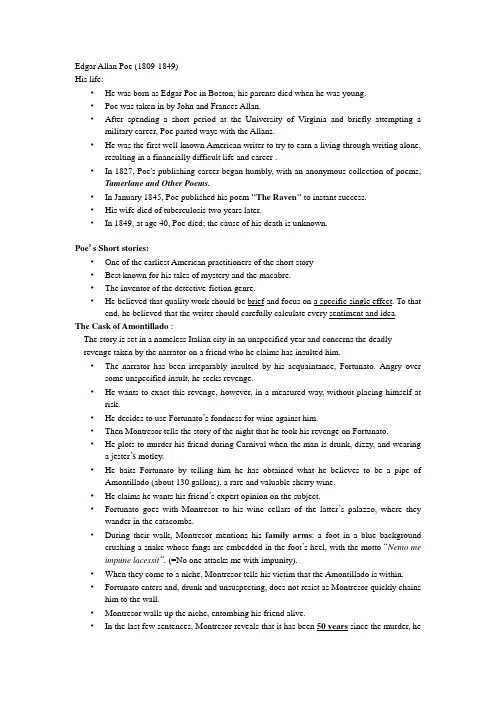
Edgar Allan Poe (1809-1849)His life:•He was born as Edgar Poe in Boston; his parents died when he was young.•Poe was taken in by John and Frances Allan.•After spending a short period at the University of Virginia and briefly attempting a military career, Poe parted ways with the Allans.•He was the first well-known American writer to try to earn a living through writing alone, resulting in a financially difficult life and career .•In 1827, Poe's publishing career began humbly, with an anonymous collection of poems, Tamerlane and Other Poems.•In January 1845, Poe published his poem "The Raven" to instant success.•His wife died of tuberculosis two years later.•In 1849, at age 40, Poe died; the cause of his death is unknown.Poe’ s Short stories:•One of the earliest American practitioners of the short story•Best known for his tales of mystery and the macabre.•The inventor of the detective-fiction genre.•He believed that quality work should be brief and focus on a specific single effect. To that end, he believed that the writer should carefully calculate every sentiment and idea.The Cask of Amontillado :The story is set in a nameless Italian city in an unspecified year and concerns the deadly revenge taken by the narrator on a friend who he claims has insulted him.•The narrator has been irreparably insulted by his acquaintance, Fortunato. Angry over some unspecified insult, he seeks revenge.•He wants to exact this revenge, however, in a measured way, without placing himself at risk.•He decides to use Fortunato’s fondness for wine against him.•Then Montresor tells the story of the night that he took his revenge on Fortunato.•He plots to murder his friend during Carnival when the man is drunk, dizzy, and wearinga jester’s motley.•He baits Fortunato by telling him he has obtained what he believes to be a pipe of Amontillado (about 130 gallons), a rare and valuable sherry wine.•He claims he wants his friend’s expert opinion on the subject.•Fortunato goes with Montresor to his wine cellars of the latter’s palazzo, where they wander in the catacombs.•During their walk, Montresor mentions his family arms: a foot in a blue background crushing a snake whose fangs are embedded in the foot’s heel, with the motto “Nemo me impune lacessit”. (=No one attacks me with impunity).•When they come to a niche, Montresor tells his victim that the Amontillado is within.•Fortunato enters and, drunk and unsuspecting, does not resist as Montresor quickly chains him to the wall.•Montresor walls up the niche, entombing his friend alive.•In the last few sentences, Montresor reveals that it has been 50 years since the murder, hehas never been caught, and Fortunato’s body still hangs from its chains in the niche where he left it.•The murderer, seemingly unrepentant, ends the story by remarking: In pace requiescat (=May he rest in peace).•The mystery in the story is in Montresor’s motive for murder. Without a detective in the story, it is up to the reader to solve the mystery.•The enduring horror of the story is the fact of punishment without proof and the insanity of the narrator.•Poe uses Fortunato’s name symbolically, as an ironic device. Though his name means “the fortunate one”in Italian, Fortunato meets an unfortunate fate as the victim of Montresor’s revenge.•Fortunato adds to the irony of his name by wearing the costume of a court jester. While Fortunato plays in jest, Montresor sets out to fool him, with murderous results.•While the carnival usually indicates joyful occasion, now it can be murderously serious. •The carnival and the costumes suggest deception, falseness and presenting an innocent image, while hiding Montresor’s true nature.•The repeated allusions to the bones of Montresor’s family that line the vaults foreshadow the story’s descent into the underworld.•The two men’s underground travels are a metaphor for their trip to hell.The Style•The story features the dark side of human nature, set in eerie places. The catacombs definitely fit that description, and Montresor’s resolutely and calmly planned revenge fit the feature of exploring the darkness that humans are capable of.•It is also written in first-person, which allows the reader to get inside the narrator's head. This way, we know the sinister thoughts of Montresor. That first-person angle adds suspense.•The narrator’s voice and style is also very distinct; Montresor is a calculated, calm, unrepentant murderer, and it shows in his commentary.Questions:1.To build suspense in the story, Poe often employs foreshadowing. Please cite someexamples.2.Please explain some symbols used in the story.。
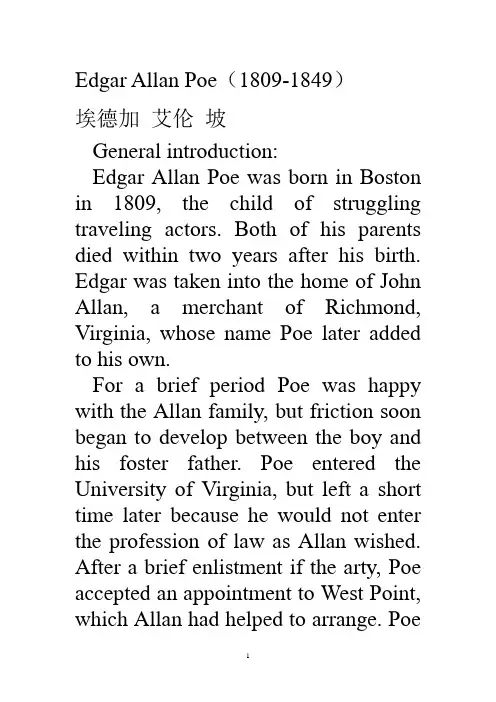
Edgar Allan Poe(1809-1849)埃德加艾伦坡General introduction:Edgar Allan Poe was born in Boston in 1809, the child of struggling traveling actors. Both of his parents died within two years after his birth. Edgar was taken into the home of John Allan, a merchant of Richmond, Virginia, whose name Poe later added to his own.For a brief period Poe was happy with the Allan family, but friction soon began to develop between the boy and his foster father. Poe entered the University of Virginia, but left a short time later because he would not enter the profession of law as Allan wished. After a brief enlistment if the arty, Poe accepted an appointment to West Point, which Allan had helped to arrange. Poewas discharged less than a year later, in 1831, for reasons that are still not completely clear. This episode marked the final break between Poe and the Allans.For a time he lived in Baltimore with his father’s sister, Mrs. Maria Clemm, and her daughter Virginia. He had already published two volumes of poems at his own expense, but had made no money and little reputation from them. When he won a contest with his story “Ms. Found in a Bottle”in 1833, the Southern novelist John Pendleton Kennedy helped him get a job as editor with the Southern Literary Messenger in Richmond. Poe lost the position because of excessive drinking and an inability to meet deadlines, but he managed to regain the job in 1835. Confident of a secure position and a steady income, Poe then married hisyoung cousin, Virginia Clemm.In his post on the Messenger, Poe showed his true talents as an editor, a poet, a literary critic, and a writer of fiction. He remained for over two years, improving the magazine and building its circulation enormously. Then he quit suddenly in 1837, partly because he felt that his salary was far too low. With his family he set out to try his luck in New York and Philadelphia.For several years he drifted. He was en editor at various times of Graham’s magazine, two newspapers, and Burton’s Gentleman’s Magazine (where “The Fall of the House of Usher”《厄舍大厦的倒塌》first appeared). The years from 1837 to 1845 were hard, yet in spite of shifting jobs and chronic poverty, Poe managed to write some of his most famous stories during thisperiod. His first collection of short shotires, Tales of the Grotesque and Arabesque,(述异集) appered in 1840. The Raven was published in 1845 as the title poem of a collection. Through his essays and reviews, Poe had also gained stature as a literary critic. Yet none of his successes brought him security. Misfortune spoiled every opportunity and frustrated his dream of starting his own magazine. Ironically, while Poe was struggling in America, his work was commanding more and more praise in Europe, where he was hailed as a pioneer in poetic and fictional techniques. His influence was especially strong on many French writers.His European fame was of little benefit to Poe. Poverty remained his typical condition. After an agonizinglyslow decline, his young wife Virginia died of tuberculosis in the winter of 1847, in their bare cottage in New York City. Two years later, at forty, Poe himself was dead. Like so much else about the man, many of the circumstances surrounding his death remain a mystery. He had traveled to Richmond to make arrangements for his marriage to a widow, Mrs. A.B. Shelton. On the return trip to New York, he stopped in Baltimore to visit some friends. A common theory is that, arriving in the city on Election Day, he fell into the hands of political hoodlums who got him drunk and made him a voter in dishonest election practices. Whatever had occurred, on October 3 Poe was found in a tavern in a drunken and desperately ill condition he died four days later.Poe’s views on nature and relation to it literature: Like Emerson, Poe adventures into the human mind. But that is where their similarities end. When Emerson sees nature, he sees emblems of the divine security; he sees order; and his seeing is inspired by and is instrumental of the Over-soul. Nature, to Poe, is disorder, offering no security. Where Emerson discovers the cosmic force of the Over-soul, Poe discerns an elusive beauty (飘忽不定,难以捉摸,难以言传,使人迷惑, elusiveness, ) and with it, the shadow of death, destruction and disintegration. If Emerson embraces Romantic affirmation, Poe embraces Romantic agony. Poetic imagination becomes a means with which Poe ventures into the labyrinthine and haunted human mind. (文学的目的在于探索那迷宫一般的,为焦虑所折磨的人的精神世界)。


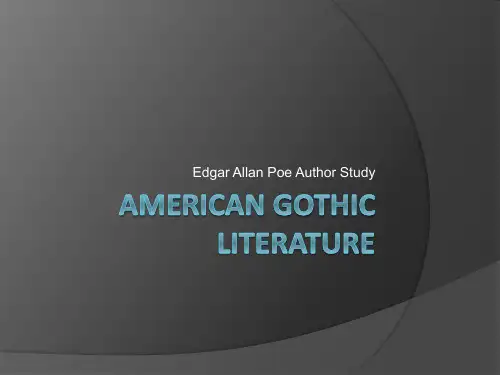
Edgar Allan Poe⏹an American writer, poet, editor and literary critic, considered part of the AmericanRomantic Movement. Best known for his tales of mystery and the macabre, Poe was one of the earliest American practitioners of the short story and is considered the inventor of the detective-fiction genre. He is further credited with contributing to the emerging genre of science fiction.⏹In 1835 Poe married his cousin, Virginia Clemm. At the time, she was 13 years old!⏹Every year, on Poe's birthday, a mysterious visitor (called the "Poe Toaster") comes toPoe's grave and leaves a half-full bottle of cognac and three red roses. Yes, Poe was a serious alcoholic. As for the roses, who knows?⏹The cause of Poe's death is a famous mystery. Some say it was alcohol, others say rabies,some even say poison. Apparently it was also possibly a brain tumor, but that seems less exciting and Poe-ish to us.Narrator⏹ A young scholarhow do you infer?In what way is it related to the theme?Time:⏹"many a quaint and curious volume of forgotten lore".⏹this lore may be about the occult or black magic⏹Midnight:⏹December: traditionally associated with the forces of darkness⏹Both midnight and December, symbolize an end of something, and also the anticipationof something new, a change, to happen.⏹the death of Edgar’s mother (Silverman, 1992:241),Place⏹Chamber :the loneliness of the man, and the sorrow he feels for the loss of Lenore. The room is richly furnished, and reminds the narrator of his lost love, which helps to create an effect of beauty in the poem.⏹The tempest outside, is used to even more signify the isolation of this man, to show acentral symbol: raven⏹sharp contrast between the calmness in the chamber and the tempestuous night.The raven as symbol and prophet⏹"devil bird"⏹"from the Night's Plutonian shore"a messenger from the afterlifePluto, the Roman god of the underworld(also known as Hades in Greek mythology).⏹Poe may also have been drawing upon various references to ravens in mythology andfolklore. In Norse mythology, Odin possessed two ravens named Hugin and Munin,representing thought and memory.The raven also gets a reputation as a bird of ill omen in the story of Genesis. According to Hebrew folklore, Noah sends a white raven to check conditions while on the ark. It learns that the floodwaters are beginning to dissipate, but it does not immediately return with the news. It is punished by being turned black and being forced to feed on carrion forever.⏹In Ovid's Metamorphoses, a raven also begins as white before Apollo punishes it byturning it black for delivering a message of a lover's unfaithfulness. The raven's role as a messenger in Poe's poem may draw from those stories.[⏹Poe said the raven is meant to symbolize "Mournful and Never-ending Remembrance".⏹When Poe had decided to use a refrain that repeated the word "nevermore," he foundthat it would be most effective if he used a non-reasoning creature to utter the word. It would make little sense to use a human, since the human could reason to answer the questions (Poe, 1850).In "The Raven" it is important that the answers to the questions are already known, to illustrate the self-torture to which the narrator exposes himself. This way of interpreting signs that do not bear a real meaning, is "one of the most profound impulses of human nature" (Quinn, 1998:441).⏹He was also inspired by Grip, the raven in Barnaby Rudge: A Tale of the Riots of 'Eightyby Charles Dickens.One scene in particular bears a resemblance to "The Raven": at the end of the fifth chapter of Dickens's novel, Grip makes a noise and someone says, "What The response is, "'Tis someone knocking softly at the shutter." Dickens's raven could speak many words and had many comic turns, including the popping of a champagne cork, but Poe emphasized the bird's more dramatic qualities.⏹was that – him tapping at the door?"Why not a parrot?because of the melancholy tone, and the symbolism of ravens as birds of ill-omen, he found the raven more suitable for the mood in the poem (Poe, 1850).⏹Why did the raven perch on the goddess of wisdom?Contrasted color⏹lead the narrator to believe that the raven spoke from wisdom⏹to signify the scholarship of the narrator⏹simply because of the "sonorousness of the word, Pallas, itself" (Poe, 1850).Key words1. Balm of Gilead 乳香⏹ a soothing ointment made in Gilead, a mountainous region of Palestine,east of theJordan river.⏹the Balm of Gilead, a reference to the Book of Jeremiah (8:22) in the Bible: "Is there nobalm in Gilead; is there no physician there? why then is not the health of the daughter ofmy people recovered?“⏹ 2. Aidenn"Aidenn", Arabic word for Eden or paradise , though Poe uses it to ask ifLenore has been accepted into Heaven3. Seraphim 六翼天使⏹"perfumed by an unseen censer / Swung by seraphim whose foot-falls tinkled..."⏹ A seraphim is one of the six-winged angels standing in the presence of God.⏹It is used to illustrate the swift, invisible way a scent spreads in a room.4. Nepenthe 忘忧草⏹"Nepenthe," from the same verse, is a drug, used by ancients to induce forgetfulness ofpain or sorrow, mentioned in Homer's Odyssey to induce forgetfulness.5. Night’s Plutonian shore⏹the mysterious, maybe dangerous and scary power of nature⏹the underworld: darkness, death, the afterlife⏹Shore is a little more mysterious. the night as a vast ocean, washing up against the edge ofthis chamber.⏹Not just a dreary night, but also a vast ocean of hellish darkness.reviewEdgar Allan Poe wrote an essay on the creation of "The Raven," entitled "The Philosophy of Composition."Length of poemsA poem should always be written short enough to be read in one sitting, and should, therefore, strive to achieve this single, unique effect. Consequently, Poe figured that the length of a poem should stay around one hundred lines, and "The Raven" is 108 lines.Subject and tone⏹“Beauty is the sole legitimate province of the poem" (Poe, 1850).⏹“Beauty of whatever kind in its supreme development invariably excites the sensitive soulto tears. Melancholy is thus the most legitimate of all the poetical tones" (Poe, 1850).⏹"the death... of a beautiful woman is unquestionably the most poetical topic in the world."Told from "the lips... of a bereaved lover" is best suited to achieve the desired effect. meter⏹Trochaic octameter八步扬抑格⏹musical, hypnotic, and captivating⏹Alliteration, internal rhyme, assonance⏹Refrain: the line or lines that are repeated in music or in verse; the "chorus" of a song.1.Is it possible that the speaker is making up or imagining some of the weird events in thispoem?⏹How would you describe the speaker's feelings for Lenore?⏹Do you think the Raven pushes our speaker over the edge, or does he do it to himself? Isnature torturing him, or his own mind?Does the talking Raven actually seem supernatural to you? Does it seem like the idea of heaven provides any lasting hope in this poem?。